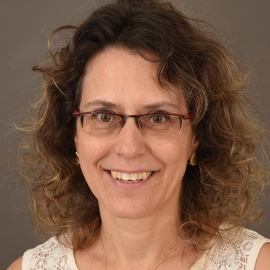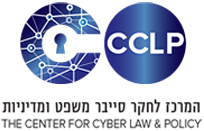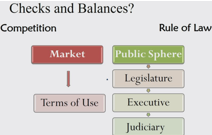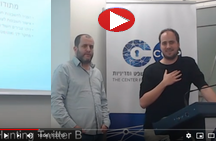Our Cyber News
Israel lacking out on blockchain, examine finds EngLink HebLink
Israel is lacking out on the potential advantages of blockchain applied sciences, comparable to making good transactions, managing protected databases, and cryptocurrencies that may compete with the traditional financial system. This conclusion is reached by a brand new coverage doc, a draft of which was printed for the primary time for public remark final week by the Israel Web Affiliation. The report, initiated by the Web Affiliation in cooperation with the Middle for Cyber, Legislation and Coverage (CCLP) on the College of Haifa, was designed “to evaluate the alternatives and challenges arising from the penetration of blockchain expertise into varied spheres, to point their penalties, and to supply coverage suggestions.”
prof. Niva Elkin-Koren a Keynote speaker on Intellectual Property and Innovation at TILTing Perspectives 2019 Conference (May 2019, Tilburg University, the Netherlands)
Contribution of Professors Niva Elkin-Koren and Michal S. Gal to the OECD roundtable on digital assistants and voice-controlled e-commerce (Paris, April, 10th, 2019)
On March 7th, 2019, CCLP's Senior Fellow, Dr. Moran Yemini, gave a talk on his article, The New Irony of Free Speech, at Cornell Tech's Digital Life Initiative Seminar Series . The brilliant Gary Zamchick has distilled the talk into this compelling drawing.
Februaty 25, 2019: Prof. Orr Dunkelman talks on GALAZ (radio station) about the use of Social Media Bots for online manipulation and disinformation during elections. 
Bot Hunting in the upcoming Israeli Elections Protecting Democracy from Self-Defeat Cyber Center for Law and Policy (CCLP), University of Haifa
The recently announced general elections in Israel on April 9, 2019, meet election officials and the general public unprepared for online manipulation and disinformation. Digital tools, such as bots, faked accounts, deep fake and fake news (“bots), are deployed to create a false sense of legitimacy, to manipulate users in ways which are unfamiliar to them, and to foment political strife. Bots may skew discourse, and generating distrust in democratic discourse and threaten to destabilize the legitimacy of the political process as a whole.
Reform initiatives to regulate the use of political bots (i.e., requiring campaigns to identify the speakers and to clearly indicate when they are not human), have only reached preliminary stages.
To enhance the resilience of the democratic process, it is therefore necessary to raise awareness to the manipulative use of bots and to equip the general public with tools to identify and fight bots.
On February 5-7,2019 the Center for Cyber, Law and Policy held a successful Hekaton to develop technological tools for identifying “suspected bots” and report them to social media platforms in accordance with their community guidelines and terms of use. These tools will soon be made available to the global community in open source.
For a video explaining the bots challenge see https://www.youtube.com/watch?v=hGqGaeZIgJw&t=3s
More on the event see here http://cyber.haifa.ac.il/index.php/events/eventdetail/30/-/the-bot-hunting-hackathon

אנו מברכים את ד"ר ריבקי ריבק, חברת המרכז, על פרסומה מאמרה:
Ribak, R. (2019). Translating privacy: developer cultures in the global world of practice. Information, Communication & Society, 1-16. https://doi.org/10.1080/1369118X.2019.1577475
המחקר נתמך על ידי קרן המחקרים של המרכז.
 אנו מברכים את ריאן שנדלר, דוקטורנט בחוג למדעי המדינה ועמית מחקר של המרכז, על פרסום מאמרו ב- Israel Law Review.
אנו מברכים את ריאן שנדלר, דוקטורנט בחוג למדעי המדינה ועמית מחקר של המרכז, על פרסום מאמרו ב- Israel Law Review.
 אנו שמחים לברך את חברת המרכז, פרופ' מיכל גל, על פרסום מאמרה (במשותף עם פרופ' דן רובינפלד) Data Standardization בכתב העת NYU Law Review. המחקר נתמך ע"י מענקי המרכז.
אנו שמחים לברך את חברת המרכז, פרופ' מיכל גל, על פרסום מאמרה (במשותף עם פרופ' דן רובינפלד) Data Standardization בכתב העת NYU Law Review. המחקר נתמך ע"י מענקי המרכז.
המאמר עומד על חשיבות הסטנדרטיזציה של (חלק מ) מאגרי הנתונים על מנת למקסם את הידע שניתן להפיק מהמידע שנאסף בעולם, וליצור סינרגיות של מידע. הוא מבוסס על ראיונות עם מדעני נתונים ומידע, וממפה את הכשלים שבמצב הנוכחי, היוצרים "מגדל בבל" של מאגרי נתונים. המאמר בוחן גם את תפקיד הממשלה ביצירת סטנדרטים של נתונים, במקרים מסוימים.
ניתן להורידו מהאתר הבא: https://papers.ssrn.com/sol3/papers.cfm?abstract_id=3326377
Congratulations to Prof. Shay ueron for advancing at the Post-Quantum Cryptography!
 We are excited to congratulate Prof. Shay Gueron from the Department of Mathematics, and a member of the CCLP's scientific committee for having the BIKE proposal advancing to the second round of the Post-Quantum Cryptography competition. The competition is organized by the US National Institute of Standards in Technology, and aims to find secure cryptographic primitives to the post-quantum era (when quantum computers will be available).
We are excited to congratulate Prof. Shay Gueron from the Department of Mathematics, and a member of the CCLP's scientific committee for having the BIKE proposal advancing to the second round of the Post-Quantum Cryptography competition. The competition is organized by the US National Institute of Standards in Technology, and aims to find secure cryptographic primitives to the post-quantum era (when quantum computers will be available).
We wish Shay (and the entire BIKE team) good luck in the next steps of the competition.
The New Irony Of Free Speech – a new paper by Dr. Moran Yemini recently published at the Columbia Science and Technology Law Review
 You can read the full paper at: http://www.stlr.org/download/volumes/volume20/Yemini.pdf
You can read the full paper at: http://www.stlr.org/download/volumes/volume20/Yemini.pdf











